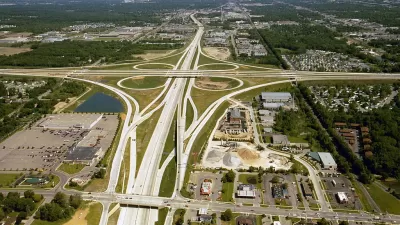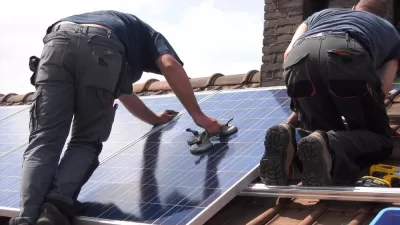A report from the Sabin Center provides a legal framework for municipal-level action on climate change policy.

The Sabin Center for Climate Change Law's Amy E. Turner and Michael Burger provide a legal framework for cities wanting to take action on climate change goals in their local jurisdictions. The document "is meant to highlight potential issues and offer a range of paths forward that cities may consider in pursuing their municipal carbon reduction goals."
Outlining the four sectors that contribute to greenhouse gas emissions––buildings, transportation, energy, and waste––the report explores carbon reduction policies that can be implemented at the municipal level and "cross-cutting legal frameworks that inform many areas of city climate policy, as well as legal concepts that influence how equity may be incorporated into those policy domains."
Potential decarbonization tools in the four sectors include:
- Buildings: building energy benchmarking, energy efficiency retrofits, changes in local building codes, restriction on energy sources.
- Transportation: land use and zoning reform, support of alternative transportation modes, congestion pricing, and investment in electric vehicle infrastructure.
- Energy: investment in renewable energy programs at the household level and the utility scale.
- Waste: recycling and organic waste collection programs, waste management requirements for new buildings, plastic bans, and regulation of waste companies.
The report also includes a chapter on equity, citing the impacts of climate change on BIPOC and low-income communities and the interwoven nature of decarbonization, housing, and jobs policies. While the authors note that all cities have different legal constraints, the framework can serve as an informational tool to guide city leaders towards the most effective decarbonization policies.
FULL STORY: Cities Climate Law: A Legal Framework for Local Action in the U.S.

Planetizen Federal Action Tracker
A weekly monitor of how Trump’s orders and actions are impacting planners and planning in America.

Congressman Proposes Bill to Rename DC Metro “Trump Train”
The Make Autorail Great Again Act would withhold federal funding to the system until the Washington Metropolitan Area Transit Authority (WMATA), rebrands as the Washington Metropolitan Authority for Greater Access (WMAGA).

The Simple Legislative Tool Transforming Vacant Downtowns
In California, Michigan and Georgia, an easy win is bringing dollars — and delight — back to city centers.

DC Backpedals on Bike Lane Protection, Swaps Barriers for Paint
Citing aesthetic concerns, the city is removing the concrete barriers and flexposts that once separated Arizona Avenue cyclists from motor vehicles.

In These Cities, Most New Housing is Under 441 Square Feet
With loosened restrictions on “micro-housing,” tiny units now make up as much as 66% of newly constructed housing.

Albuquerque’s Microtransit: A Planner’s Answer to Food Access Gaps
New microtransit vans in Albuquerque aim to close food access gaps by linking low-income areas to grocery stores, cutting travel times by 30 percent and offering planners a scalable model for equity-focused transit.
Urban Design for Planners 1: Software Tools
This six-course series explores essential urban design concepts using open source software and equips planners with the tools they need to participate fully in the urban design process.
Planning for Universal Design
Learn the tools for implementing Universal Design in planning regulations.
Smith Gee Studio
City of Charlotte
City of Camden Redevelopment Agency
City of Astoria
Transportation Research & Education Center (TREC) at Portland State University
US High Speed Rail Association
City of Camden Redevelopment Agency
Municipality of Princeton (NJ)





























